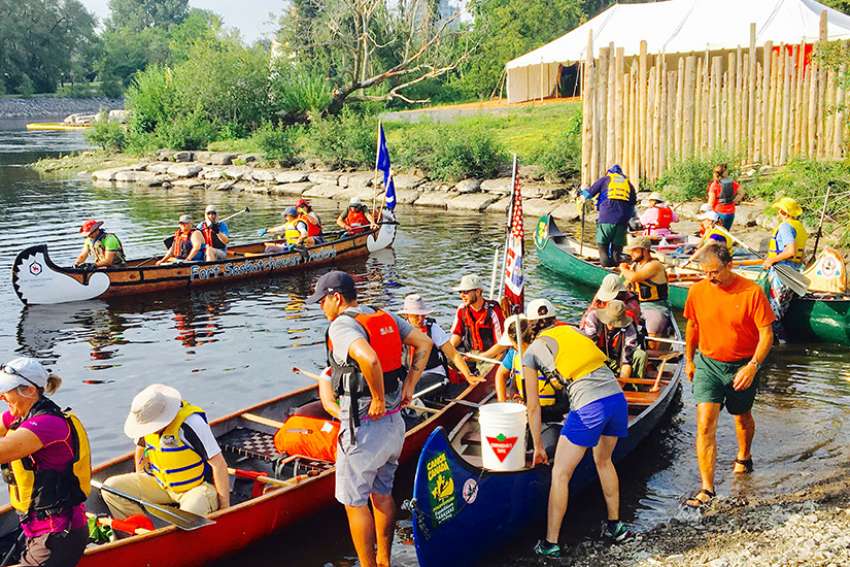“I’m very hopeful; I’m very pro-reconciliation,” said Watts, speaking at a fundraiser Aug. 10 for the Canadian Canoe Pilgrimage for 30 paddlers—Jesuits, Indigenous peoples and others canoeing an old trade route from Midland, Ont., on Lake Huron, to Montreal.
“The canoe is a powerful, powerful vehicle of reconciliation,” Watts said.
Reconciliation comes through “looking at each other in a way to see each other’s humanity,” he said. “We’re all related. We’re all brothers and sisters in this boat together.”
“We can try to move the boat of reconciliation by trying to paddle in all different directions at the same time,” he said.
He praised the Canoe pilgrimage for meeting “metaphorically” the challenges of reconciliation, through “bursting myths and stereotypes” to “figure out a way to paddle together.”
The paddlers, who arrived in Montreal Aug. 14, had completed 80 per cent of their journey when they arrived in Ottawa Aug. 9. Inspired by the Truth and Reconciliation Commissions’ (TRC) Calls to Action, the paddlers also marked Canada’s 150th anniversary by following a similar canoe pilgrimage in 1967 on Canada’s centennial.
The fundraiser at the Royal Ottawa Golf Club in Gatineau not only raised money but also awareness of the injustices Indigenous peoples’ in Canada have suffered.
Admitting there is “a lot of ugliness in terms of our joint history,” Watts said he sees many good people standing up for justice and participating in the spiritual process of reconciliation and healing.
“It took a long time to get to the place we’re at now,” he said. “A lot of healing work needs to be done.”
While more needs to be done at the level of government, Watts said he is gratified to see “civil society, spiritual leaders, civilian leaders taking ownership of reconciliation, regardless of what governments are doing.”
“Reconciliation isn’t just the purview of the government, but of communities, individuals, church groups, NGOs and other civil society groups deciding they want to work together to build a different future,” he said.
A residential school survivor recently told Watts he had finally said, “I love you,” to his daughter. Because of being forcibly separated from his parents at the school, he didn’t know telling his children he loved them was part of parenting, Watts said.
It’s this kind of healing action that make Watts see reconciliation as “like snowflakes,” many little things that accumulate, become “snowballs” and grow.
When AFN National Chief Phil Fontaine began to talk about his experience of being sexually abused at a residential school “a lot of people were upset with him,” said Watts, who served as his chief of staff. “They thought he should leave well enough alone.”
Others said it was good he was doing it because many of the pathologies plaguing Indigenous communities, such as high rates of suicide, addiction and violence, could be “traced back to residential schools,” Watts said.
As the 21st century began, people began asking “what are we doing to do about the residential schools,” and the first class action lawsuit was certified, he said. The lawsuits began to grow until there were 10,000 individual lawsuits and seven class action suits.
The AFN, the Government of Canada and the churches involved in running the residential schools came to the 2013 IRSSA, the largest class action settlement in Canadian history.
Watts, who now teaches at Queen’s University, said he has noticed people go through three stages when they learn about the residential schools. Though most have heard of them, “when they understand the depth of the tragedy, they are shocked,” he said. They ask, “How could this happen?”
Residential schools are “not an ancient history,” because the last one closed in 1996, he said. The legacy is “with us right now and it’s going to be with us for a long time in the future.”
The second reaction is people get angry, he said. “They get ticked off at their parents, their schools, their churches for not teaching this. ‘How could this have happened and we were not told about it?’”
The third reaction is: “We’re going to do something about it,” Watts said.
Whether what they choose to do “nudges this forward” or “takes big steps in the reconciliation process,” Watts said, “maybe even just thinking about doing something is doing something.
“Thinking, reflecting, changes the way they think about society, about Indigenous people, and how to get past the settler/Indigenous people paradigm,” he said.
“Every good thought; every good notion has a spirit, has energy associated with it,” he said.


